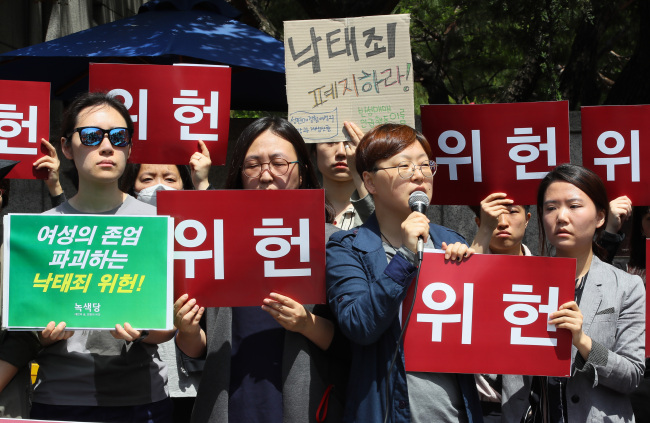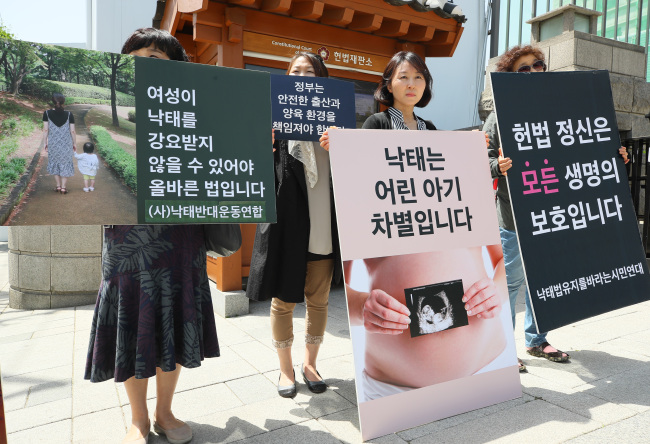After South Korea’s Constitutional Court reviewed a challenge from a medical doctor who was prosecuted for performing almost 70 abortions on Thursday, the nation continues to be divided on whether or not abortion should be decriminalized.
The doctor, who performed the illegal procedure 69 times from November 2013 to June 2015, said at the court that the current ban endangers women and their well-being, as it limits their right to choose their own destinies and make choices for their reproductive health.
Under articles 269 and 270 of South Korea’s Criminal Act, any woman who undergoes an abortion could face one year of imprisonment or a fine of up to 2 million won ($1,800).
The doctor, who performed the illegal procedure 69 times from November 2013 to June 2015, said at the court that the current ban endangers women and their well-being, as it limits their right to choose their own destinies and make choices for their reproductive health.
Under articles 269 and 270 of South Korea’s Criminal Act, any woman who undergoes an abortion could face one year of imprisonment or a fine of up to 2 million won ($1,800).

Doctors who perform the procedure face heavier penalties; they could face up to two years behind bars.
Although the law, which was implemented in 1953, rarely results in prosecutions, many women’s activists in the country have been calling for legalization of abortion. Last year, more than 230,000 Koreans signed a petition to the presidential office to abolish the law.
Yet the nation is still highly divided on the matter. Even government ministries have responded differently to the ongoing case involving the medical doctor.
While the Ministry of Gender Equality announced Wednesday that it has set its opinion against the abortion ban, the Defense Ministry has openly endorsed current laws by saying that it is of “great public interest” to protect the “lives of embryos.”
The Ministry of Gender Equality, on the other hand, stressed that the Convention on the Elimination of All Forms of Discrimination against Women, which was ratified by South Korea in 1984, states that “state parties shall take all measures to eliminate discrimination against women in all matters relating to marriage and family relations, (including) the same rights to decide freely and responsibly on the number and spacing of their children.”
The ministry also stated that because it is only the mother of a child who gets punished should she undergo an abortion, and the law requires those who wish to undergo the procedure to obtain permission from the father of the child, it is often abused by men as a form of “revenge” against their ex-girlfriends or wives.
According to local women’s rights group Womenlink, out of 12 women who have sought for help at the organization with regards to abortion, 10 had problems because their ex-partners or spouses had threatened to report them for undergoing an abortion.
Some of the men did so to prevent their wives from leaving them, while others used it as a way to control the women’s behavior and lives.

“These cases show that the law is being abused rather than fulfilling its initial purpose (which is to save lives),” the Ministry of Gender Equality wrote in its statement submitted to the Constitutional Court.
According to a survey organized by the Korean Women’s Development Institute, 1 in 5 Korean women who have been pregnant have had an abortion. Only 1 percent said they had a legal reason -- instances of incest, rape and when the woman’s health is at risk by the pregnancy -- to undergo the procedure.
Koh Kyung-shim, a pro-choice gynecologist and member of Human Med, a group of liberal-leaning medical professionals, said the current laws force women to undergo unsafe procedures, thereby threatening their health and even lives.
“Because abortion is illegal, women are prevented from getting the right information and proper medical care, and this is putting teenagers, women who are disabled and women of low socioeconomic positon at a higher risk, potentially damaging their health and dignity,” Koh said at the Supreme Court on Thursday.
But the current abortion law is still endorsed and supported by many, including women.
While some women protested against the current abortion ban in front of the Constitutional Court on Thursday, pro-life women also held a rally in support of the current laws, saying it protects lives.
On May 8, a total of 96 university professors, including Ku In-hoe, an associate professor of bioethics at the Catholic University of Korea, submitted a statement to the Constitutional Court, saying they endorse the current laws on abortion.
“An embryo has a life of its own -- it is not a part of the mother’s body. No woman has the right to decide on what to do with an embryo’s life,” professor Ku told a local newspaper in a recent interview.
The professor also added that she is against all abortions, including in cases of rape or incest.
“Decriminalizing abortion is simply making embryos take responsibility for things they are not responsible for. They are the most innocent among those involved.”
By Claire Lee (dyc@heraldcorp.com)


















![[Today’s K-pop] Treasure to publish magazine for debut anniversary](http://res.heraldm.com/phpwas/restmb_idxmake.php?idx=642&simg=/content/image/2024/07/26/20240726050551_0.jpg&u=)